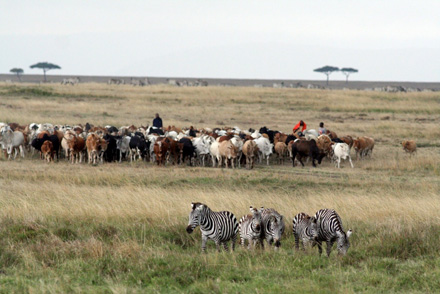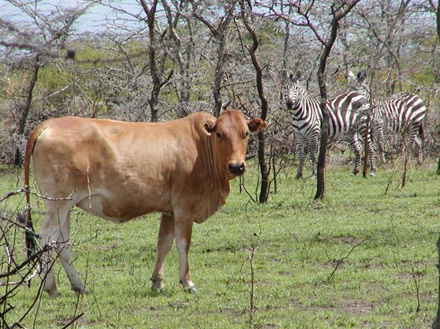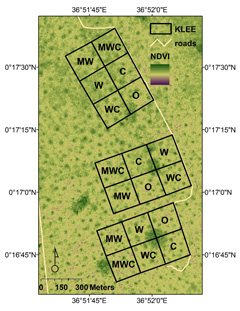Navigation
Study Finds Grazing by Wild Animals Like Zebra Doesn't Always Harm, and May Help, Livestock Like Cattle
African ranchers often prefer to keep wild grazers like zebras off the grass that fattens their cattle. But a new study by Kenyan and University of California at Davis researchers shows that grazing by wild animals doesn't always harm, and may sometimes benefit, cattle.
 |
| Grazing by wild animals doesn't always harm, and may benefit, livestock like cattle. Photograph by Rob Pringle |
African ranchers often prefer to keep wild grazers like zebras off the grass that fattens their cattle.
But a new study by Kenyan and University of California at Davis researchers shows that grazing by wild animals doesn't always harm, and may sometimes benefit, cattle.
The results are published in this week's issue of the journal Science.
"Although savanna rangelands worldwide are managed on the premise that cattle and wildlife compete for food, there is little scientific information to support this assumption," said Wilfred Odadi, a researcher at the Mpala Research Centre in Kenya and a co-author of the paper.
 |
| Cattle and wild animals like zebra: not always mutually exclusive on African rangelands. Photograph by Ryan Sensenig |
"When we look at the effect of wildlife on cattle, we find that they sometimes do suppress weight gain by cattle, but also sometimes enhance it," said Truman Young, a plant scientist at UC Davis and lead author of the paper.
"Generally the decision has been to exclude wild animals, but we're saying that things are not that simple," Young said.
"The finding that wildlife has a positive effect on cattle growth and production during times of plenty adds new insight into the role that facilitation plays in natural communities," said Saran Twombly, program director in the National Science Foundation's Division of Environmental Biology, which funded the research. "Results from this study also speak directly to the critical importance of biodiversity in maintaining natural ecosystems," Twombly said.
 |
| A map of the study site in Africa where the research on ungulates and cattle was conducted. |
The researchers enclosed 10-acre plots of savanna rangeland with fences to exclude wild animals--principally zebras.
Then they weighed the cattle grazing either with or without wild grazers to measure how much weight they put on at different times of the year, which is the bottom-line for ranchers.
Odadi and colleagues found that during the dry season, grazing by wild animals reduced weight gain by cattle, but in the wet season, cattle actually put on more weight when they grazed alongside wildlife.
The explanation is that during the wet season, grass can grow long and become rank, inaccessible and poor in nutritional value.
"When the grass grows very fast and is at risk of becoming rank, having zebras is beneficial," Young said. "They are more than willing to knock back the rank grass."
That means higher-quality, fresher grass for the cattle.
It's not yet clear whether there is a net benefit over a whole year or series of years, Young said, because conditions can vary considerably from year to year. Ranchers are beginning to explore additional ways to control rank grass, such as controlled burns.
"From a management perspective, the positive effect of wildlife on weight gain by cattle during the wet season suggests that wildlife conservation is not necessarily detrimental to, and can be compatible with, cattle production," Odadi said.
"Our findings provide further evidence that biodiversity conservation and economic development can be simultaneously achieved in human-occupied savanna landscapes."
Other co-authors of the paper are Moses Karachi, Egerton University, Kenya, and Shaukat Abdulrazak, National Council for Science and Technology, Nairobi, Kenya.
The work also was funded by the Smithsonian Institution, the National Geographic Society, the African Elephant Program of the U.S. Fish and Wildlife Service, and the International Foundation for Science.
This news is from National Science Foundation (NSF) http://www.nsf.gov, 22 September 2011
Search
Latest articles
Agriculture
- World Water Week: Healthy ecosystems essential to human health: from coronavirus to malnutrition Online session Wednesday 24 August 17:00-18:20
- World Water Week: Healthy ecosystems essential to human health: from coronavirus to malnutrition Online session Wednesday 24 August 17:00-18:20
Air Pollution
- "Water and Sanitation-Related Diseases and the Changing Environment: Challenges, Interventions, and Preventive Measures" Volume 2 Is Now Available
- Global Innovation Exchange Co-Created by Horizon International, USAID, Bill and Melinda Gates Foundation and Others
Biodiversity
- It is time for international mobilization against climate change
- World Water Week: Healthy ecosystems essential to human health: from coronavirus to malnutrition Online session Wednesday 24 August 17:00-18:20
Desertification
- World Water Week: Healthy ecosystems essential to human health: from coronavirus to malnutrition Online session Wednesday 24 August 17:00-18:20
- UN Food Systems Summit Receives Over 1,200 Ideas to Help Meet Sustainable Development Goals
Endangered Species
- Mangrove Action Project Collaborates to Restore and Preserve Mangrove Ecosystems
- Coral Research in Palau offers a “Glimmer of Hope”
Energy
- Global Innovation Exchange Co-Created by Horizon International, USAID, Bill and Melinda Gates Foundation and Others
- Wildlife Preservation in Southeast Nova Scotia
Exhibits
- Global Innovation Exchange Co-Created by Horizon International, USAID, Bill and Melinda Gates Foundation and Others
- Coral Reefs
Forests
- NASA Satellites Reveal Major Shifts in Global Freshwater Updated June 2020
- Global Innovation Exchange Co-Created by Horizon International, USAID, Bill and Melinda Gates Foundation and Others
Global Climate Change
- It is time for international mobilization against climate change
- It is time for international mobilization against climate change
Global Health
- World Water Week: Healthy ecosystems essential to human health: from coronavirus to malnutrition Online session Wednesday 24 August 17:00-18:20
- More than 400 schoolgirls, family and teachers rescued from Afghanistan by small coalition
Industry
- "Water and Sanitation-Related Diseases and the Changing Environment: Challenges, Interventions, and Preventive Measures" Volume 2 Is Now Available
- Global Innovation Exchange Co-Created by Horizon International, USAID, Bill and Melinda Gates Foundation and Others
Natural Disaster Relief
- STOP ATTACKS ON HEALTH CARE IN UKRAINE
- Global Innovation Exchange Co-Created by Horizon International, USAID, Bill and Melinda Gates Foundation and Others
News and Special Reports
- World Water Week: Healthy ecosystems essential to human health: from coronavirus to malnutrition Online session Wednesday 24 August 17:00-18:20
- STOP ATTACKS ON HEALTH CARE IN UKRAINE
Oceans, Coral Reefs
- World Water Week: Healthy ecosystems essential to human health: from coronavirus to malnutrition Online session Wednesday 24 August 17:00-18:20
- Mangrove Action Project Collaborates to Restore and Preserve Mangrove Ecosystems
Pollution
- Zakaria Ouedraogo of Burkina Faso Produces Film “Nzoue Fiyen: Water Not Drinkable”
- "Water and Sanitation-Related Diseases and the Changing Environment: Challenges, Interventions, and Preventive Measures" Volume 2 Is Now Available
Population
- "Water and Sanitation-Related Diseases and the Changing Environment: Challenges, Interventions, and Preventive Measures" Volume 2 Is Now Available
- "Water and Sanitation-Related Diseases and the Changing Environment: Challenges, Interventions, and Preventive Measures" Volume 2 Is Now Available
Public Health
- Honouring the visionary behind India’s sanitation revolution
- Honouring the visionary behind India’s sanitation revolution
Rivers
- World Water Week: Healthy ecosystems essential to human health: from coronavirus to malnutrition Online session Wednesday 24 August 17:00-18:20
- Mangrove Action Project Collaborates to Restore and Preserve Mangrove Ecosystems
Sanitation
- Honouring the visionary behind India’s sanitation revolution
- Honouring the visionary behind India’s sanitation revolution
Toxic Chemicals
- "Water and Sanitation-Related Diseases and the Changing Environment: Challenges, Interventions, and Preventive Measures" Volume 2 Is Now Available
- Actions to Prevent Polluted Drinking Water in the United States
Transportation
- "Water and Sanitation-Related Diseases and the Changing Environment: Challenges, Interventions, and Preventive Measures" Volume 2 Is Now Available
- Urbanization Provides Opportunities for Transition to a Green Economy, Says New Report
Waste Management
- Honouring the visionary behind India’s sanitation revolution
- Honouring the visionary behind India’s sanitation revolution
Water
- Honouring the visionary behind India’s sanitation revolution
- Honouring the visionary behind India’s sanitation revolution
Water and Sanitation
- Honouring the visionary behind India’s sanitation revolution
- Honouring the visionary behind India’s sanitation revolution

